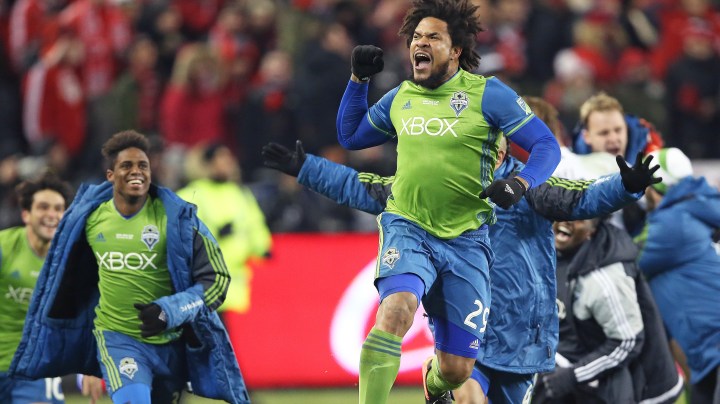MLS Rejected a $4 Billion Media Deal That Would Require a Promotion & Relegation System

Seattle Sounders celebrate after winning the 2016 MLS Cup over Toronto. Photo: Claus Andersen/Getty Images.
Of all of the reasons why MLS isn’t as big as its creators and continuing operators want it to be, one of the most glaring is the lack of a promotion-and-relegation system. Widely accepted as the way to manage the immense infrastructure lovingly known as “world soccer,” this system sparks competition across the dour ends of each league–completely abolishing the controversial idea of “tanking”–while giving fans from cities not lucky enough to be a charter member of the league hope that they one day too might live to see their favorite team get embarrassed by Sebastian Giovinco.
And yet, MLS shows no sign of wanting to adopt a pyramid, promotion-relegation-based system any time soon. This was made clearer this week, as the league was presented with a massive media rights bid from MP & Silva that would demand that system as part of the deal. Let’s get this out of the way: MLS couldn’t have accepted the massive $4 billion bid even if it wanted to. At least not right now. Their current deal with broadcasters ESPN, Univision, and Fox prohibits them from even negotiating a new deal, and so, whether MLS would accept a move to promotion-relegation is largely irrelevant at this time; for what it’s worth, Commissioner Don Garber has repeatedly shot down the idea.
However, MLS is a league that has a lot of catching up to do in the United States; after all, it is by far the youngest of the “big” leagues in the country, having been founded in 1993. Through a grueling growing period, the league languished behind even the NHL, as soccer is still seen as a sport for Europeans and not so-called “red-blooded Americans.” However, with the rising prominence of soccer at all levels and the US Men’s National Team (good finishes in the World Cup, including qualifying for the knockouts over Cristiano and company will do that), MLS can finally claim a strong foothold as a niche-but-growing league for the world’s biggest sport.
That rising success, largely but not entirely due to things outside of the MLS’ control, could be a curse for the league, however. Instead of trying to fill a role as a league where new things are tried and unique ideals flourish–especially in comparison to stodgy powerhouses like MLB or the NFL–MLS has largely stuck by its guns, even bending rules to favor the bigger teams. We can’t even keep up with the Designated Player changes that have been made so that the LA Galaxy can keep bringing in famous names from Europe.
So, while theoretically impossible at the moment, the MP & Silva bid does hint at a better soccer future in the United States, one without silly things such as salary caps, designated players, and below-market salaries. Already seeing an influx of talented Latino players–who flock to the league for its proximity to their home countries and to play in a league that, by accident or design, is experiencing a boon in Latino fans–MLS could continue to capitalize on its rising global appeal by forcing its owners to spend more in order to field competitive teams, lest they risk relegation.
It’s not an if-then proposition; by no means will a promotion-relegation system fix everything that ails MLS. There will have to be both an institutional change to how the country deals with soccer at the youth levels–beginning to prioritize development over winning meaningless youth trophies–and a further increase in fan interest, preferably on the wings of something as unlikely as, say, the USMNT making a World Cup semi-final. However, by increasing the reach and money investment in its (lowercase) premier league, it’s possible that MLS could help usher in that bright future, wherein top players from Europe come to this side of the world for more than just a payday and “retirement league” play. Instead, MLS could finally begin to claw its way towards the goal laid out for it so many years: to be a truly top-tier global league.